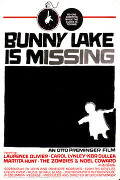
Directed by
Otto Preminger
107 minutes
Rated PG
Reviewed by
Bernard Hemingway

Bunny Lake Is Missing
Single American mother Ann Lake (Carol Lynley) arrives in London with her four-year-old daughter, nicknamed Bunny, to live with her brother,Stephen (Keir Dullea). She leaves Bunny at a kindergarten but when she returns to collect there is no sign of her daughter and as it transpires, no evidence that she ever was there. Scotland Yard Superintendent Newhouse (Laurence Olivier) is called in to handle the case and becomes sceptical that the child even exists.
The premise of Bunny Lake Is Missing which is based on the 1957 mystery novel by Marryam Modell (aka Evelyn Piper) and adapted by John and Penelope Mortimer with uncredited contributions from Ira Levin is intriguing but its execution is not.
From the get-go, in which Ann leaves her child in an apparently staff-less day care centre on her first day without so much as a fare-thee-well, the question of whether or not Bunny Lake really exists is kept alive by contrivances that barely manage to keep together the yawning gaps in the plot's credibility.
Preminger tries to pad out the proceedings with a couple of minor questionable characters in the form of Noël Coward as a pathetically creepy drunk with an interest in shrunken heads and S & M and Martita Hunt as an eccentric authoress writing a book about children’s nightmares but in terms of plot. logically Steven must have been the perp and by the film’s mid-point Keir Dullea’s staring robotic performance makes it completely clear that Steven is bat-crazy (allegedly Kubrick cast Dullea in 2001 without an audition on the basis of his performance here) . Until that point Lynley at least leaves unsure if Anne is nutty but that is not really any great achievement as she simply plays the part of the genuinely grieving mother while the script in the form of Olivier’s unflappably methodical detective leads us to believe that she is, as it is put at one point, “delusionary”.
When the explanation of the mystery does come it is done with heavy-handed exposition, cheap psychologising and B grade horror movie tropes. Just to squeeze a bit of life into what is otherwise a wearingly plaintive film Preminger throws in snatches of ‘60s British pop group The Zombies doing a few upbeat songs.
Want something different?





